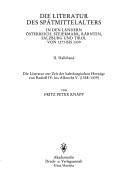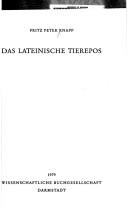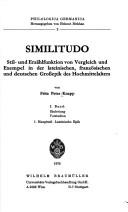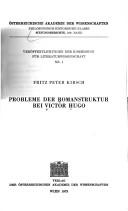| Listing 1 - 10 of 165 | << page >> |
Sort by
|
Book
Year: 1965 Publisher: Tübingen Eberhard-Karls-Universität
Abstract | Keywords | Export | Availability | Bookmark
 Loading...
Loading...Choose an application
- Reference Manager
- EndNote
- RefWorks (Direct export to RefWorks)
Book
Year: 1989 Publisher: Kiel
Abstract | Keywords | Export | Availability | Bookmark
 Loading...
Loading...Choose an application
- Reference Manager
- EndNote
- RefWorks (Direct export to RefWorks)
Book
ISBN: 1009177745 1009188631 100953274X 9781009188647 100918864X 9781009188630 9781009177740 Year: 2024 Publisher: Cambridge : Cambridge University Press,
Abstract | Keywords | Export | Availability | Bookmark
 Loading...
Loading...Choose an application
- Reference Manager
- EndNote
- RefWorks (Direct export to RefWorks)
Propositional quantifiers are quantifiers binding proposition letters, understood as variables. This Element introduces propositional quantifiers and explains why they are especially interesting in the context of propositional modal logics. It surveys the main results on propositionally quantified modal logics which have been obtained in the literature, presents a number of open questions, and provides examples of applications of such logics to philosophical problems.
Modality (Theory of knowledge) --- Modality (Linguistics) --- Grammar, Comparative and general --- Quantifiers. --- Language and logic. --- Semantics.
Book
ISBN: 9780192870025 Year: 2023 Publisher: Oxford : Oxford University Press,
Abstract | Keywords | Export | Availability | Bookmark
 Loading...
Loading...Choose an application
- Reference Manager
- EndNote
- RefWorks (Direct export to RefWorks)
The notions of necessity and possibility, as well as the notion of a possible world, are ubiquitous in philosophy. Nevertheless, these notions remain controversial. It also remains controversial whether metaphysics requires notions drawing distinctions which are finer than those which can be drawn in terms of necessity and possibility, such as the recently much-discussed notion of grounding. In order to make progress on these debates, this book develops a general framework for theorizing about such intensional notions using the tools of higher-order logic.The Foundations of Modality begins by motivating the use of higher-order logic, and introduces a particularly simple form of higher-order logic. Progress is made on well-trodden territory concerning modality and possible worlds by considering first the question how fine propositions are individuated. Peter Fritz uses both logical results and philosophical arguments to motivate a relatively coarse-grained individuation of propositions. Fritz shows that a number of putative metaphysical notions are ruled out by this theory of individuation. Furthermore, the theory allows the controversial notion of (metaphysical) necessity to be delineated as the broadest necessity, which applies just to the single tautologous proposition. This book also vindicates appeals to possible worlds: First, it shows that if anything plays the theoretical role of possible worlds, then certain propositions do so. Second, it argues that there are in fact the required propositions playing the role of possible worlds; this is shown using the notion of plural quantification over propositions in higher-order logic.
Book
ISBN: 9781009177740 9781009532747 9781009177733 Year: 2024 Publisher: Cambridge Cambridge University Press
Abstract | Keywords | Export | Availability | Bookmark
 Loading...
Loading...Choose an application
- Reference Manager
- EndNote
- RefWorks (Direct export to RefWorks)

ISBN: 320101611X 9783201016117 Year: 1994 Volume: 1 Publisher: Graz: Akademische Druck- und Verlagsanstalt,
Abstract | Keywords | Export | Availability | Bookmark
 Loading...
Loading...Choose an application
- Reference Manager
- EndNote
- RefWorks (Direct export to RefWorks)
German literature --- anno 500-1499 --- Salzburg --- Trento --- Austrian literature --- History and criticism. --- History and criticism --- Old High German, 750-1050 --- Middle High German, 1050-1500 --- Austrian literature - History and criticism.

ISBN: 353407808X Year: 1979 Volume: Bd. 121 Publisher: Darmstadt Wissenschaftliche Buchgesellschaft
Abstract | Keywords | Export | Availability | Bookmark
 Loading...
Loading...Choose an application
- Reference Manager
- EndNote
- RefWorks (Direct export to RefWorks)
Poetry --- Comparative literature --- Thematology --- Medieval Latin literature --- anno 500-1499 --- Epic poetry, Latin --- Latin poetry, Medieval and modern --- Animals in literature --- Poésie épique latine --- Poésie latine médiévale et moderne --- Animaux dans la littérature --- History and criticism --- Histoire et critique --- Epic poetry, Latin (Medieval and modern) --- -History and criticism --- Animals in literature. --- History and criticism. --- Poésie épique latine --- Poésie latine médiévale et moderne --- Animaux dans la littérature

ISBN: 3700300956 Year: 1975 Publisher: Wien Braumüller
Abstract | Keywords | Export | Availability | Bookmark
 Loading...
Loading...Choose an application
- Reference Manager
- EndNote
- RefWorks (Direct export to RefWorks)
Fiction --- Medieval Latin literature --- anno 500-1499 --- Poetry, Medieval --- Epic poetry, European --- Style, Literary --- Figures of speech --- Poésie médiévale --- Style littéraire --- Figures de rhétorique --- History and criticism --- Histoire et critique --- -Figures of speech --- -Style, Literary --- Literary style --- Literature --- Criticism --- Diction --- Language and languages --- Rhetoric --- European poetry --- Medieval poetry --- English language --- Imagery --- Speech, Figures of --- Tropes --- Symbolism --- European epic poetry --- Style --- Aesthetics --- Figures of speech. --- Style, Literary. --- History and criticism. --- Literary style. --- Poésie médiévale --- Style littéraire --- Figures de rhétorique

ISBN: 3700100280 9783700100287 Year: 1973 Volume: 288 1 Publisher: Wien: Österreichische Akademie der Wissenschaften,
Abstract | Keywords | Export | Availability | Bookmark
 Loading...
Loading...Choose an application
- Reference Manager
- EndNote
- RefWorks (Direct export to RefWorks)
Hugo, Victor --- Hugo, Victor, --- Technique --- Technique. --- Hugo, Victor-Marie --- Hjuho, Viktor --- Critique et interprétation. --- Hiwkō, Vikʻtʻor, --- Hījū, Fīktūr, --- Gi︠u︡go, Viktor, --- Hsiao-o, --- Hyowgo, Viktor, --- Hugo, Victor Marie, --- Yü-kuo, Wei-kʻo-to, --- Yü-kuo, --- Hūkū, Fīktūr, --- Ounkō, Viktor, --- Hi︠u︡ho, Viktor, --- Hi︠u︡ho, V. --- Hugo, Viktor, --- Huygo, Victo, --- Gi︠u︡go, V. --- Hyugo, Vhikṭara, --- Igo, Viktor, --- I︠U︡go, Viktor, --- Hyūkō, Vikṭar, --- Hīyūkō, Vikṭar, --- Hiwgō, Viktor, --- Гюго, Виктор, --- הוגאָ, װ. --- הוגא, וויקטאר --- הוגא, וויקטאר, --- הוגא, ויקטור, --- הוגא, װיקטאר --- הוגא, װיקטאר, --- הוגו ויקטור, --- הוגו, ויקטור --- הוגו, ויקטור, --- هوجو، فيكتور، --- 雨果, --- Higu, Fikṭuṛ, --- Critique et interprétation. --- Hugo, Victor, - 1802-1885 - Technique --- Hugo, victor (1802-1885) --- Romans --- Hugo, Victor, - 1802-1885
Book
ISBN: 3534045521 9783534045525 Year: 1972 Volume: 226 Publisher: Darmstadt: Wissenschaftliche Buchgesellschaft,
Abstract | Keywords | Export | Availability | Bookmark
 Loading...
Loading...Choose an application
- Reference Manager
- EndNote
- RefWorks (Direct export to RefWorks)
Logic --- Theory of knowledge --- Aristotle --- Knowledge, Theory of --- Aristoteles --- Contributions in logic. --- Contributions in theory of knowledge. --- Knowledge, Theory of. --- Logic. --- Aristotle. --- Aristote --- Aristotile --- Argumentation --- Deduction (Logic) --- Deductive logic --- Dialectic (Logic) --- Logic, Deductive --- Intellect --- Philosophy --- Psychology --- Science --- Reasoning --- Thought and thinking --- Epistemology --- Methodology --- Aristoteles. --- Arisṭāṭṭil --- Aristo, --- Aristotel --- Aristotele --- Aristóteles, --- Aristòtil --- Arisṭū --- Arisṭūṭālīs --- Arisutoteresu --- Arystoteles --- Ya-li-shih-to-te --- Ya-li-ssu-to-te --- Yalishiduode --- Yalisiduode --- Ἀριστοτέλης --- Αριστοτέλης --- Аристотел --- ארסטו --- אריםטו --- אריסטו --- אריסטוטלס --- אריסטוטלוס --- אריסטוטליס --- أرسطاطاليس --- أرسططاليس --- أرسطو --- أرسطوطالس --- أرسطوطاليس --- ابن رشد --- اريسطو --- Pseudo Aristotele --- Pseudo-Aristotle --- アリストテレス
| Listing 1 - 10 of 165 | << page >> |
Sort by
|

 Search
Search Feedback
Feedback About UniCat
About UniCat  Help
Help News
News